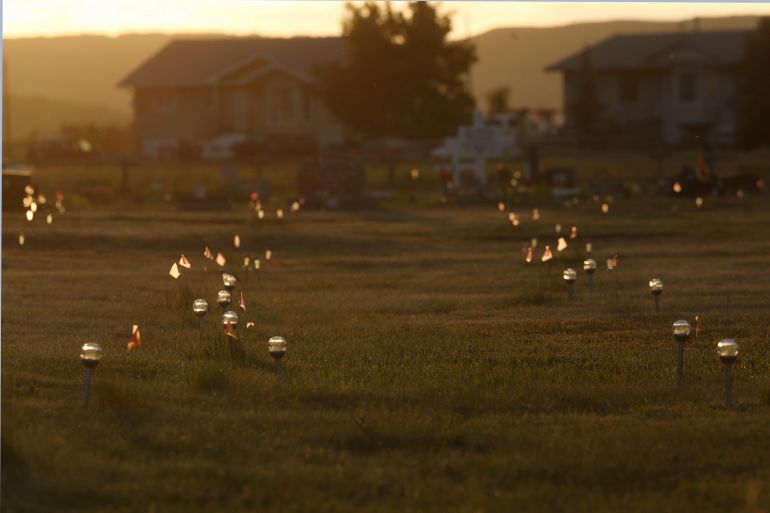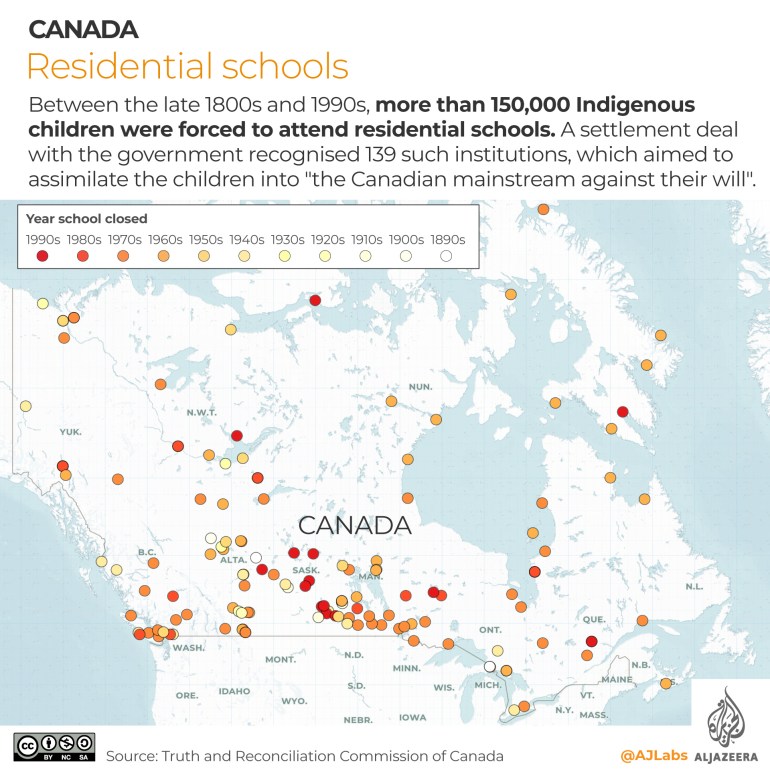Canada: Protesters demand investigation into residential schools
Call comes after more than 1,000 unmarked graves found at institutions Indigenous children were forced to attend.

Warning: The story below contains details of residential schools that may be upsetting. Canada’s Indian Residential School Survivors and Family Crisis Line is available 24 hours a day at 1-866-925-4419.
Hundreds of people took part in a rally in the Canadian capital on Saturday to demand an independent investigation into the “residential schools” that Indigenous children were forced to attend for nearly a century and where hundreds of unmarked graves have been discovered in recent weeks.
Keep reading
list of 4 itemsMore unmarked residential school graves discovered in Canada
Indigenous chief to Trudeau: Turn over residential school records
Unearthing Canada’s dark past
The March for Truth and Justice rally on Parliament Hill in Ottawa was led by New Democratic Party legislators Charlie Angus and Mumilaaq Qaqqaq, who represents the northern territory of Nunavut.
“We need to come together and tell the federal institution and Justin Trudeau that enough is enough: Indigenous Peoples need truth and justice,” Qaqqaq wrote in an Instagram post ahead of the event.
“That means a special prosecutor and a fully-funded independent investigation, with international observers present, into Canada’s crimes against Indigenous peoples.”
. @MumilaaqQaqqaq led a march of hundreds today from Parliament Hill to the Prime Minister’s Office then to the Department of Justice to call for the appointment of a special prosecutor to investigate the crimes against humanity committed in Canada’s residential "school" system. pic.twitter.com/dZOviBk4in
— Peace Brigades International – Canada (@PBIcanada) July 31, 2021
More than 1,000 unmarked graves have been discovered on the grounds of former residential schools across Canada since late May, renewing intergenerational trauma and pain for Indigenous people.
Between the late 1800s and the 1990s, more than 150,000 First Nation, Metis and Inuit children were forcibly separated from their families and forced to attend residential schools, which aimed to “assimilate” them into white Canadian society.
The government-funded, church-run institutions were rife with abuse and more than 4,000 children are believed to have died there.
Indigenous community leaders have said there is little doubt that more unmarked graves exist, and they have called on the Canadian government and the Catholic Church, which operated most of the institutions, to help them fund searches for more unmarked graves.
They also demanded that Canada and the church release any documentation that could help identify any remains that are discovered at the sites.
A federal commission of inquiry found that Canada had committed “cultural genocide” through its residential schools system and, in 2015, it issued 94 Calls to Action to address the lasting harms of the policy.

But very few of the Truth and Reconciliation Commission’s recommendations have been completed to date – and Indigenous people in Canada, as well as international observers, have called on Prime Minister Justin Trudeau to do more.
Crown-Indigenous Relations and Northern Affairs Canada told Al Jazeera in an email last month that the 2019 budget provided 33.8 million Canadian dollars ($28m) over three years to support the recommendations on deaths at the schools specifically.
Trudeau and his ministers also have reiterated that they remain committed to supporting First Nation communities in their efforts.
Still, a group of United Nations experts last month urged Canada and the Catholic Church to conduct “prompt and thorough” investigations into the deaths, including forensic examination of the remains, and work to identify and register the missing children.
“The judiciary should conduct criminal investigations into all suspicious death and allegations of torture and sexual violence against children hosted in residential schools, and prosecute and sanction the perpetrators and concealers who may still be alive,” they said at that time.
Indigenous community leaders also have called on police to lay criminal charges against the Canadian government, churches and individual perpetrators of crimes committed in the institutions. Others have encouraged the International Criminal Court (ICC) to open an investigation.